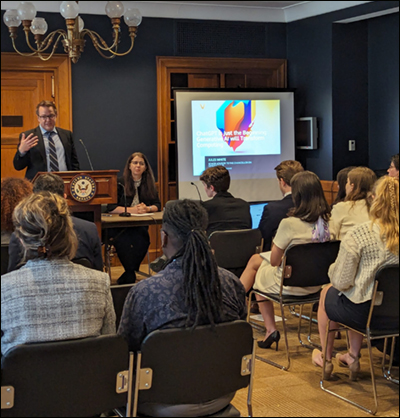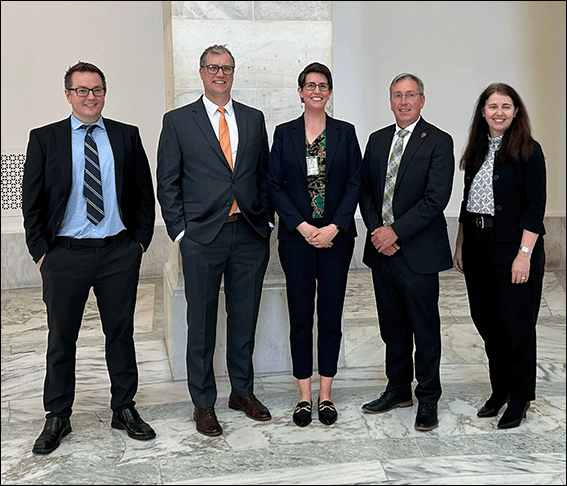Vanderbilt University’s Jules White, a leading computer scientist and expert on large language models and prompt engineering, visited Capitol Hill recently to share his expertise with lawmakers. As the Senior Advisor to the Chancellor for Generative AI in Education and Enterprise Solutions, he was invited to participate in a bipartisan Senate AI Caucus briefing in May for Senate staff on the transformative role of generative AI in higher education.

White joined a panel of computer science experts from universities across the country for a roundtable discussion on integrating generative AI technologies on campuses. He provided insights into how generative AI is revolutionizing higher education, from classroom instruction to administrative processes.
White stressed the value of incorporating generative AI as a tool to enhance human capabilities rather than replace them entirely, arguing that generative AI works alongside individuals to streamline processes and solve complex problems. He shared that educators could adapt teaching methods and learning goals to harness the potential of generative AI tools effectively and mitigate cheating. By incorporating generative AI as an asset in education, it can drive innovation and ensure every student is ready for a future with generative AI.
“Generative AI is the most important technical innovation of my lifetime that will transform nearly every job role. This ongoing transformation has created a huge generative AI skills gap in both our education system and the workplace,” said White. “I’m thrilled to support Senate staff as they consider what, if any, role federal policymakers might play in determining how to close this generative AI skills gap and provide equitable access to everyone.”
In addition to the roundtable discussion, White met with the offices of the Tennessee Congressional delegation to discuss Vanderbilt’s leading role in generative AI research and education. He highlighted initiatives that drive innovation and economic development in the state during meetings with the offices of Sen. Marsha Blackburn, R-Tenn., Sen. Bill Hagerty, R-Tenn., BA’81, JD’84, Rep. Chuck Fleischmann, R-Tenn., and Rep. Mark Green, R-Tenn.
White showcased several key initiatives, including his free online Prompt Engineering for ChatGPT course on the Coursera platform, which makes ChatGPT more accessible and useful for the broader public. He also emphasized the university’s Initiative on the Future of Learning & Generative AI, the establishment of the AI Law Lab at Vanderbilt Law School, the upcoming Symposium On Music & AI hosted by the Blair School of Music and Vanderbilt’s plans to establish a college dedicated to computing, AI, and data science.

Additionally, White engaged with professional staff from the Senate Committee on Health, Education, Labor, and Pensions. The committee has been considering the potential opportunities and risks associated with generative AI across its various areas of focus. Congressional staff were eager to discuss how federal policies can support generative AI research and education efforts both in Tennessee and nationwide. The overarching theme centered on understanding how to maximize the benefits of generative AI while preventing negative impacts.
These meetings, arranged by Associate Director of Federal Relations Heather Bloemhard, underscore the vital role of Vanderbilt’s Office of Federal Relations in connecting elected officials with the university’s experts and thought leaders, enhancing Vanderbilt’s influence on policy.
“Generative AI is a transformative tool, so it’s imperative that policymakers understand both its potential and the importance of education on how to use it,” White said. “Generative AI is not something to fear, but rather a tool that can augment and enhance human reasoning.”
“As generative AI continues to reshape industries and society, the contributions of Vanderbilt experts like White serve as catalysts for informed policymaking and technological advancement,” said Bloemhard. “Vanderbilt remains committed to engaging with policymakers at the highest levels to ensure that generative AI policies align with ethical principles and drive positive societal outcomes.”